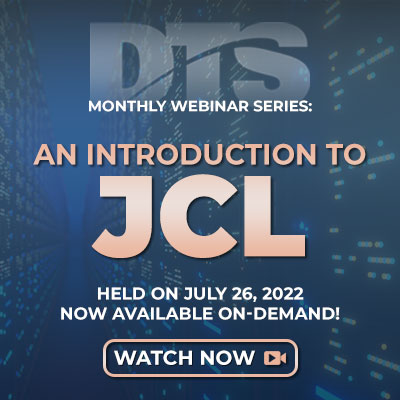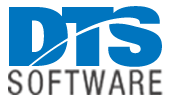DTS Webinar Recap: An Introduction to JCL
The goal of the DTS Educational Webinar Series is to educate engineers new to z/OS® on concepts and skills often unique to the z/OS environment and to serve as a refresher to seasoned engineers in need of reviewing skills they may have forgotten along the way. DTS CTO Steve Pryor’s virtual masterclass in storage management continued in July with An Introduction to JCL.
One of the many differences between the mainframe and open systems environments is the mainframe’s Job Control Language, or JCL. In z/OS systems, nothing takes place that doesn’t involve using JCL to define and allocate the datasets, memory, disks, tapes, subsystems, and other resources needed. JCL’s over 50-year history means it’s extraordinarily powerful, complex, and often incomprehensible to users new to the z/OS platform.
In our July webinar, Pryor discussed topics such as: what JCL is and isn’t, JCL’s purposes and importance, as well as the major JCL control statements and their use.
In the Beginning
JCL originated from the 80-character punch card and retains its format of 80-character records still today. JCL was the first facility that allowed an individual user to specify exactly what resources they would need for their work, and to allow the system to parcel out the resources according to what was needed and what was available.
The Basics of JCL
Once you grasp the basic purpose and components of JCL, it’s not difficult to understand. First, what is JCL supposed to do?
- Identify a unit of work (typically a batch job)
- Specify resources required:
- Where the job is to run and its priority
- What programs, procedures, and libraries are needed
- What datasets are required and how they are used
- What Disk and tape units are needed
- SYSOUT and instream datasets and disposition
Next, what are JCL parameters? As Pryor explains in the webinar, there are two types of parameters when dealing with JCL:
- Positional Parameters
- Must occur first when required
- How to code when the positional parameter is not required and can be omitted
- Keyword Parameters
- Are of the form “keyword=value”
- Always follow any positional parameters
- Can appear in any order
Important JCL Statements
While there are far too many JCL Statements to teach in one day, Pryor covers some of the more important ones, paying special attention to those that are either required or are the most utilized, including the Job Statement, Exec Statement, DD Statements, JES2 Control Statements, and JES2 Execution Control Statements. This portion of the webinar includes examples that are available in the PDF download of the presentation.
JCL Statement Reference Resources
One of the great things about Pryor’s approach is the sharing of his in-depth knowledge of where and how to find key reference materials should you need to dig deeper. In the webinar, he once again provides information on the go-to reference guides available that cover JCL.
 Learn More in our Webinar Available On-Demand
Learn More in our Webinar Available On-Demand
Our July webinar is now available on-demand in the DTS webinar library. As with each of our webinars, “An Introduction to JCL” is a 60-minute informative and educational look at an important topic in the mainframe space. It includes numerous examples, how-to guides, and references on where to find more information should you need it.
If you weren’t able to attend or would like to review the material presented, you can view it on-demand and download a copy of the slide deck by using this link. Be sure to join us each month for our complimentary webinar series. Go to https://dtssoftware.com/webinars for the latest schedule.

